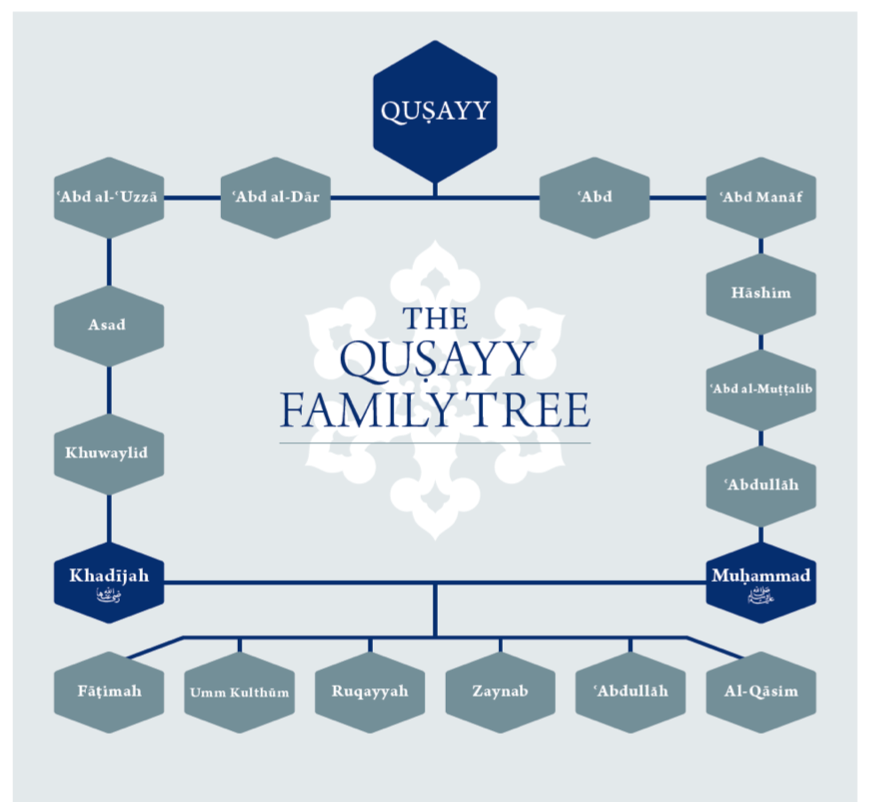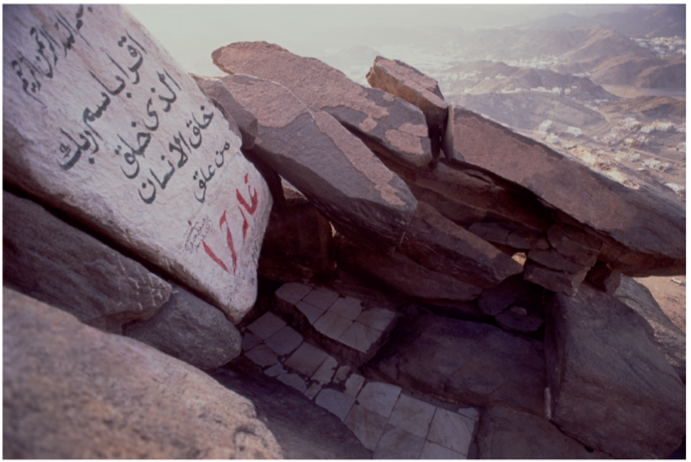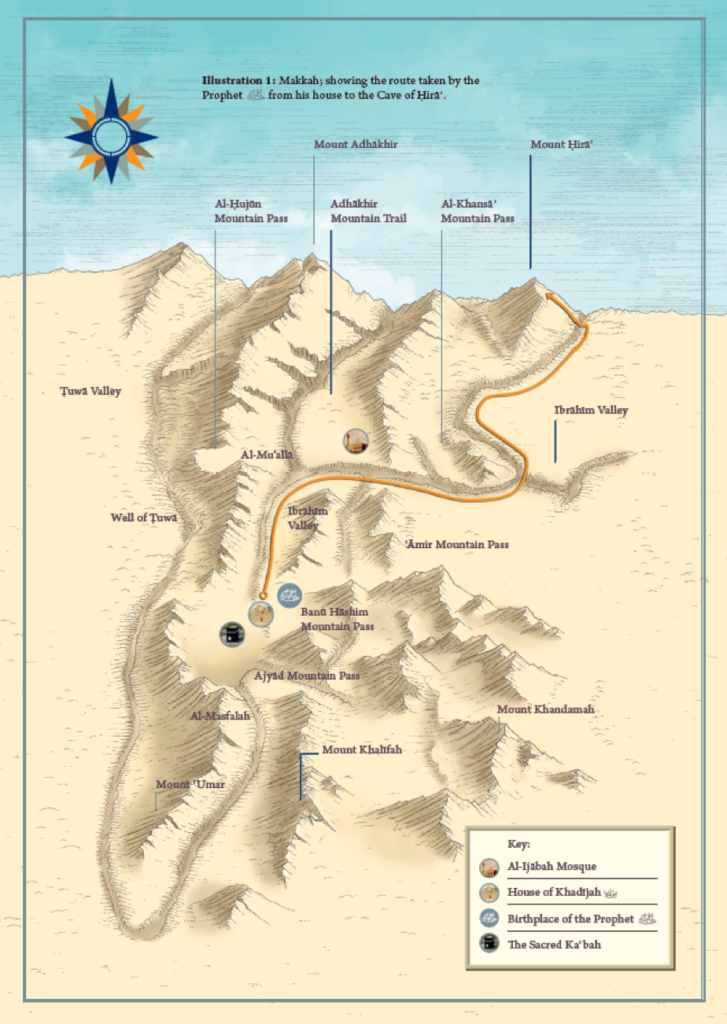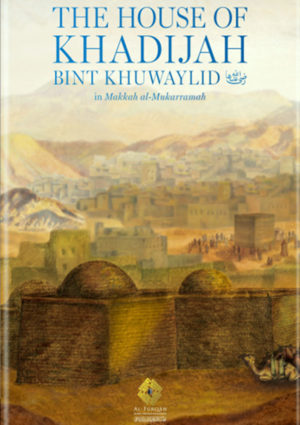Ahmed Zaki Yamani
She is the Mother of the Faithful, the first wife of the Prophet ﷺand the finest of them, the mother of his children, and the first person to believe in him.
Her Lineage and Upbringing before Islam
Her full name is Khadījah bint Khuwaylid ibn Asad ibn ‘Abd al-‘Uzzā ibn Qušayy, and she therefore belongs to the Asad clan of the tribe of Quraysh. Her mother was Fāŧimah bint Zā’idah and was from the clan of ‘Āmir ibn Lu’ayy, also of Quraysh1.She is related to the Prophet ﷺthrough his grandfather Qušayy, making her the closest relative to him from amongst all his wives. Her family possessed nobility, authority, and wealth. Ibn Isħāq mentions that she was a wealthy and noble woman, who would employ men to trade with her wealth in return for a share of the profits – Quraysh being a trading nation2.
Khadījah (رضي الله عنها) was born in Makkah and was raised in a famous and respected household. Her father died on the day of the battle of al-Fujjār. She was married twice before the Prophet ﷺto two Arab noblemen: Abū Hālah ibn Zurārah ibn al-Nabbāsh al-Tamīmī, with whom she had two children, Hind and Hālah; and ‘Atīq ibn ‘Ā’id ibn ‘Umar ibn Makhzūm, with whom she had Hind bint ‘Atīq.
Ibn Sa‘d states regarding the children that Khadījah (رضي الله عنها) bore with these previous husbands:
“Khadījah (may God be pleased with her) bore for Abū Hālah a son called Hind and another named Hālah. Then, after Abū Hālah, ‘Atīq ibn ‘Ābid ibn ‘Abdullāh ibn ‘Umar ibn Makhzūm married her. For him she bore a daughter also called Hind, who later married Šayfiyy ibn Umayyah ibn ‘Ābid ibn ‘Abdullāh ibn ‘Umar ibn Makhzūm, her cousin, for whom she bore a son called Muħammad. The descendants of this Muħammad are called Banū al-Ŧāhirah (Clan of the Pure Woman) due to the status of Khadījah (may God be pleased with her). They had remnants in Madinah, but subsequently died out. Khadījah (may God be pleased with her) was known as Umm Hind3.”
Khadījah was very fortunate when it came to trade. Her caravans were continuously roaming between Makkah and the different trading cities of the time. As a result, wealth and fame were added to her high status and noble descent, and she became one of Makkah’s notable merchants. She was also extremely generous and refined in character, as was well known amongst the women of Makkah and those close to her. They would visit her in her house specifically to benefit from her generosity and grace. If she went to circumambulate the Ka‘bah, they would go with her, surrounding her, only discussing serious matters and nothing trivial, no one wishing anything improper to be said that might displease Khadījah (رضي الله عنها). On one occasion, when they were at the ancient house (the Ka‘bah), a Jew came and called them, saying: “O women of Taymā’ (or according to one narration: O women of Quraysh), a prophet will appear in this era, so whoever wants to become his wife, then let her do so.” The women that were surrounding Khadījah (رضي الله عنها) became annoyed on her behalf and threw stones at him4.
Her Marriage to the Prophet ﷺ
Biographical and other sources mention that Khadījah was very fortunate when it came to trade, employing men to trade for her. One of these men was the Messenger of God ﷺ. It is narrated that she once sent him to Syria in the company of her servant Maysarah. When they returned, her servant told her about the Prophet’s ﷺcharacter and the trustworthiness and purity he had shown. Besides this, there were the blessings that God bestowed on him; his profits multiplying. All this made her to want to marry him, and before long his uncle, Ħamzah ibn ‘Abd al-Muŧŧalib, approached her uncle ‘Amr ibn Asad ibn ‘Abd al-‘Uzzā on his behalf, seeking her hand in marriage. The dowry was fixed at twenty young camels, and the two were married; this being 15 years before his ﷺprophethood began. At the time he ﷺwas 25 years old and she was 40. The couple lived a noble and joyful life, during which God blessed them with six children: al-Qāsim, ‘Abdullāh, Zaynab, Ruqayyah, Umm Kulthūm, and Fāŧimah, may God be pleased with them all5.
Khadījah (رضي الله عنها) loved the Prophet ﷺvery deeply. She would seek his pleasure and favour, so much so that she gave him her slave Zayd ibn Ħārithah when she noticed his affection for him.

Her role in Supporting the Prophet ﷺ
Khadījah succeeded in establishing a happy home for the Prophet in the period just before his prophethood. She supported him both physically and financially, and also helped him with his seclusion in the cave of Ħirā’. With the first revelation, she bolstered him and believed him. When he came to her shaking out of fear, saying: “Cover me, cover me”, she covered him until his fear passed. Through her powerful intellect, strong personality, and penetrating wisdom, she played an important role in strengthening and supporting him ﷺ. [See drawing 1 and picture 1]


Al-Bukhārī narrates in his chapter on How did the revelation begin?, as does Muslim in his Book of Faith, Chapter on the Start of Revelationthat the Mother of the Faithful ‘Ā’ishah (may God be pleased with her) said:
“The first form of revelation to the Messenger of God ﷺwas the true dream during sleep. Whenever he saw a dream it would be as clear as the break of day. After this, he was made to love solitude, so he would seek it in the Cave of Ħirā’, where he would stay worshiping for many nights, before returning to his family. He would equip himself for this stay. Then he would return to Khadījah (may God be pleased with her) and equip himself in a similar manner.
This continued until the truth came to him while he was in the Cave of Ħirā’. The angel came to him and said: ‘Read!’ He said: ‘I cannot read.’ The Prophet ﷺsaid: ‘Then he took hold of me and squeezed me until I was utterly exhausted. Then he let me go, and said: “Read!” I said: “I cannot read.” Then he took hold of me and squeezed me for a second time until I was again exhausted. Then he let me go, and said: “Read!” I again said: “I cannot read.” So he took hold of me and squeezed me for the third time. Then he said: “{1Read! In the name of your Lord who created...}” until the end of the sūrah.’
The Prophet ﷺcame back with these verses, trembling to the core. He went in to Khadījah (may God be pleased with her) and said: ‘Cover me! Cover me!’ She covered him, until the fear had left him, then he told her what had happened, saying: ‘I feared for my life.’ Khadījah responded: ‘No, by God. God would never humiliate you. You maintain family ties, help to carry people’s burdens when they are tired, you give to the poor, you are generous to your guests, and help people in times of hardship.’
Khadījah (may God be pleased with her) then took him to Waraqah ibn Nawfal, her cousin, who had become a Christian. He could write in Hebrew, in which he had written as much of the Gospel as God had willed. He was an old man and had become blind. Khadījah said to him: ‘Cousin! Listen to what your nephew has to say.’ Waraqah said to him: ‘Nephew! What is it that you have seen?’ The Messenger of God ﷺtold him what had happened, and Waraqah said: ‘This is the Nāmūs – Gabriel ﷺ– who God sent to Moses. If only I was a young man. If only I could live to see the day when your people banish you.’ The Prophet ﷺsaid: ‘Will they banish me?’ He said: ‘Yes. No man has ever brought anything like this without being fought. If your day comes and I am still alive, I will support you with all my strength.’ Before long, Waraqah passed away and the revelation ceased [for a while]6.”
The prophetic mission began with the revelation of the words of God, Most High:
{1You, wrapped in your cloak, 2arise and give warning! 3Proclaim the greatness of your Lord; 4purify your garments.}7
This means: you wrapped in your cloak, stand up and warn people about the punishment of God, Most High. As such it was an order for him to call people to Islam. When this happened, he ﷺsubmitted himself to his lord’s command and began calling people to Islam, initially in secret so as not to incite the enmity of Quraysh. He started with his family and friends, his wife Khadījah (رضي الله عنها) being the first to accept, and Zayd ibn Ħārithah, her freed slave, also becoming a Muslim8.
Khadījah (رضي الله عنها) devoted herself and her house to the service of the new Muslim community, while also using her status to defend the Messenger of God ﷺfrom harm. For this reason, the Prophet felt the utmost sadness at her death, for she had been the best help and support he could have had.
Such was the great Khadījah (رضي الله عنها), to whom God himself sent greetings in appreciation of the service she offered Islam, while also giving her glad tidings of a house in Paradise made from a hollow pearl, in which there will be no tiredness and no fighting. In this way, she became the first into Paradise, just as she was the first into Islam. When she received the Prophet’s ﷺinvitation, she did not hesitate to accept it for a moment, becoming the first to believe in him. Not only did she believe in him, but she supported his mission, kept him company in times of loneliness, and helped him overcome the many hardships he faced. Her reward was in accord with her deeds, God giving her the good news of a house in Paradise made from a hollow pearl, wherein there is no shouting and no tiredness9.Numerous prophetic traditions recounting this have been recorded in the works of al-Bukhārī and others. Ibn Ħajar al-‘Asqalānī in explaining this ħadīth states:
“When the Messenger ﷺcalled people to Islam, Khadījah answered the call willingly. There was no need for him to raise his voice, or argue, or exert himself. Instead, she took away his fatigue, kept him company through his isolation, and alleviated every hardship. So it is only appropriate that the house that her Lord promised her in Paradise reflects her actions.10”
The Prophet ﷺconfirmed her superiority by not taking a second wife alongside her for as long as she lived. After her death, he grieved deeply for her, and continued to mention her, speak highly of her, praise her, and acknowledge the love he felt for her as well as her superiority over all his other wives. He stated: “I was blessed with loving her11”and: “She believed in me, when others disbelieved; she called me truthful, when others called me a liar; she supported me with her wealth, when others refused; and Allah blessed me with children by her, when He withheld them through all other women.”12For this reason, ‘Ā’ishah (رضي الله عنها) was particularly jealous of her, as is shown in numerous narrations recorded by al-Bukhārī and others.13
After her death, he ﷺused to maintain ties with her friends and treat them well out of loyalty for her, may God be pleased with her.14Al-Bukhārī and Muslim both report that, if he ﷺslaughtered a sheep, he would say: “Send this to the friends of Khadījah.”15
When the Prophet ﷺheard the voice of Hālah, Khadījah’s sister, he would remember the voice of his wife and feel at ease; or, according to one narration recorded by both al-Bukhārī and Muslim, feel alarm.16
Her Excellence as Attested by the Prophetic Sunnah
The Prophet ﷺconfirmed her excellence when he said:
“The best of the women of Paradise are Khadījah bint Khuwaylid, Fāŧimah bint Muħammad, Āsiyah bint Muzāħim (the wife of Pharoah), and Maryam the daughter of ‘Imrān, may Allah be pleased with them.”17
He also confirmed that she was the best woman on earth in her time when he ﷺsaid:
“The best of its women is Maryam bint ‘Imrān, and the best of its women is Khadījah bint Khuwaylid.”18
Khadījah’s (رضي الله عنها) wisdom and excellence towards her husband set her apart, and her reward for this was nothing less than God sending Gabriel (as) to give her the good news of a house in Paradise. Abū Hurayrah (رضي الله عنها) is reported to have said:
“Gabriel (as) came to the Prophetﷺand said: ‘O Messenger of God! This is Khadījah coming with a bowl (of food or drink). When she arrives give her greetings from her Lord, and from me, and give her the good news of a house for her in Paradise made from a hollow pearl, wherein there is no shouting and no tiredness.19’”
She was a righteous woman, may God be pleased with her. Her deep faith caused her to occupy a place in the heart of the Prophet ﷺ, which none of his other wives could surpass, not even ‘Ā’ishah (رضي الله عنها). ‘Ā’ishah was highly jealous of her due to how often the Prophet ﷺwould mention her, miss her, and praise her:
“I did not feel jealous of any of the Prophet’s ﷺwives like I did of Khadījah, even though I never saw her. The Prophet ﷺwould mention her so often, and sometimes he would slaughter a sheep, cut it up and send it to Khadījah’s friends. Sometimes I would say to him: ‘It is as if there is no other woman in the world apart from Khadījah.’ He would reply: ‘She..., and she..., and she bore me children20.’”
The key point from this ħadīth is that the Prophet ﷺdid not forget Khadījah (رضي الله عنها) after her death, and the extent to which he mentioned and praised her demonstrate the extent of his love. Likewise, his feeding and showing generosity to her friends demonstrate the permanence of that love21.Scholars have explained the verse {Did He not find you in need and make you self-sufficient?}22as meaning: “God enriched you through Khadījah”23, and this only goes to demonstrate her excellence.
She died, may God be pleased with her, three years before the Prophet’s ﷺmigration, and prior to his ascent into Heaven (mi‘rāj). At the time she was 65 years of age. She was buried in al-Ma‘lāh cemetary [See picture 2]24,having left this world after a brilliant and full life. She remains remembered, praised, and loved to this day. May God shower her with His good pleasure.
Key Events that Occurred at the House of Khadījah
The importance and merit of the house of Khadījah(رضي الله عنها) has been the subject of countless narrations in books of scholars, historians, and jurists. Abū Sulaymān mentions in his book al-Amākin al-Ma’thūrah fī Makkah al-Mukarramahthat a large number of scholars and historians spoke about the merit and importance of Khadījah’s house, amongst them: al-Azraqī, al-Fākihī, Ibn al-Jawzī, Muħibb al-Dīn al-Ŧabarī, ‘Izz al-Dīn ibn Jamā‘ah, Taqī al-Dīn al-Fāsī, Jamāl al-Dīn ibn Żahīrah, Muħammad ibn ‘Allān al-Šiddīqī, al-Šabbāgh, and others25.
Qāđī ‘Iyāđ (d. 544/1149) includes in his book al-Shifā’ bi-Ta‘rīf Ħuqūq al-Mušŧafā ﷺa chapter entitled “On Honouring and Respecting Him”, in which he states:
“Part of honouring and respecting him is to honour all of his belongings and to show respect to all of the sites and places linked with him, both in Makkah and Madinah, and to the places he loved, and to what he touched and to anything known to have had some relation to him 26ﷺ.”
What is meant by his belongings is his furnishings and his clothes. The sites and places linked with him are the places he visited and the places he inhabited, and then there are also the places he loved27.Qāđī ‘Iyāđ adds about the greatness of these places:
It is only fitting for these places – that were filled with revelation, visited by Gabriel and Michael, and by the angels and the Spirit (Gabriel), the earth of which holds the body of the leader of mankind, and from which spread the religion of God and the example of His Messenger, the first land to touch the skin of the Chosen One – that their courtyards be honoured, that their fragrances be inhaled, and that their buildings and walls be kissed28.
In this house, Khadījah (رضي الله عنها) gave birth to all of the Prophet’s ﷺchildren, and in this house she died. The Prophet ﷺlived here until he migrated to Yathrib. It is said that ‘Aqīl ibn Abī Ŧālib later sold it to Mu‘āwiyah, when the latter was Caliph, who then turned it into a mosque29.According to a different account, Ma‘tib ibn Abī Lahab is the one reported to have sold it30.
This house saw the beginnings of the message carried by the Prophet ﷺ. Here Gabriel (as) brought down the Noble Qur’an to the trustworthy Messenger. Here were revealed the verses instructing the Prophet to spread the message and call people to Islam. Here the Prophet ﷺfound his first help and support. Both al-Bukhārī and Muslim record that:
“The Prophet ﷺreturned, trembling to the core, following the descent of the revelation. He went in to Khadījah bint Khuwaylid (may God be pleased with her) and said: ‘Cover me! Cover me!’ She covered him, until the fear had left him, then he told her what had happened, saying: ‘I feared for my life.’ Khadījah responded: ‘No, by God! God would never humiliate you. You maintain family ties, help to carry people’s burdens when they are tired, you give to the poor, you are generous to your guests31.”
In this house were revealed the words of God Most High:
{1You, wrapped in your cloak, 2arise and give warning! 3Proclaim the greatness of your Lord; 4purify your garments}32.
Revelations were brought to this house on a number of occasions. The spot in the house where Gabriel used to descend was subsequently known as the Dome of Revelation[*], as is stated by al-Fāsī33.
In this house, Khadījah (رضي الله عنها) became the first person to accept Islam. It was here too that Zayd ibn Ħārithah, the freed slave of Khadījah, joined the religion, as did ‘Alī ibn Abī Ŧālib, who grew up in the house34.
In this house also, the heart of the Prophet ﷺwas washed with the water of Zamzam, and from here started the night journey to Jerusalem and then into heaven (the Isrā’and Mi‘rāj). It is recorded in the books of al-Bukhārī and Muslim from Abū Dharr that the Prophet ﷺsaid:
“The roof of my house in Makkah was torn apart and Gabriel (as) came down. He split open my chest and washed it with the water of Zamzam. He then brought a bowl made of gold, filled with wisdom and faith, and emptied it into my chest before sealing it up. He then ascended with me into the sky...”35
Alternative narrations indicate that the journey to Jerusalem began from the Sacred Mosque in Makkah and that the splitting of the Prophet’s ﷺchest occurred in the semi-circular enclosure adjoining the Ka‘bah (al-Ħaŧīm) or the section of this enclosure know as the Ħijr.36As Ibn Ħajar notes, these differing reports can be reconciled if we view the splitting of the Prophet’s ﷺchest as happened in his house, with Gabriel then afterwards bringing the Prophet to the Sacred Mosque37.
The Prophet ﷺlived in this house for about 28 years; 15 years before his prophethood, and 13 years after. As noted, he ﷺmarried at the age of 25 and revelation first came to him when he was forty.
The house witnessed a number of important events. Some of the disbelievers of Quraysh that lived nearby took to throwing filth and blood in front of it and at its door. Those most famous for this were the uncle of the Prophet ﷺAbū Lahab, his wife Umm Jamīl, described in the Qur’an as the carrier of firewood, and also ‘Uqbah ibn Abī Mu‘ayŧ38.
Al-Azraqī, al-Fākihī, and al-Fāsī all mention that the Prophet ﷺused to take cover in a specific place in his house to be safe from the stones thrown by the disbelievers. This place, situated next to the Dome of Revelation, was subsequently known as the Dome of Hiding39.
Some of the disbelievers of Quraysh used to come to the house to listen to the Qur’an and drown it out with foolish talk. Amongst these was Abū Jahl, who would listen before returning the following day to mock and harm the Prophet 40ﷺ.
This house also received the new Muslims, who were fed and shown great hospitality by Khadījah (رضي الله عنها). Lessons, particularly for women, were taught here, as happened in the house of al-Arqam ibn Abī al-Arqam, where the Qur’an would resound.
This is also the house that was blockaded by the disbelievers when the Prophet ﷺwanted to migrate to Yathrib and when they resolved to murder him. It was here that ‘Ali ibn Abī Ŧālib slept in the Prophet’s ﷺplace, after he left it for the last time; this being in the thirteenth year of his mission, 622 CE41.
| Source note: This was published in: The House of Khadeejah Bint Khuwaylid (may Allah be pleased with her) in Makkah al-Mukarramah: A Historical Study of its Location, Building, and Architecture - English version, 2014, Al-Furqan Islamic Heritage Foundation, London, UK, pp. 21-38 |
[*]Translator’s note: The name ‘Dome of Revelation’ comes from a small dome that was later built over the spot.
| Source note: This was published in: The House of Khadeejah Bint Khuwaylid (may Allah be pleased with her) in Makkah al-Mukarramah: A Historical Study of its Location, Building, and Architecture - English version, 2014, Al-Furqan Islamic Heritage Foundation, London, UK, pp. 21-38 |


